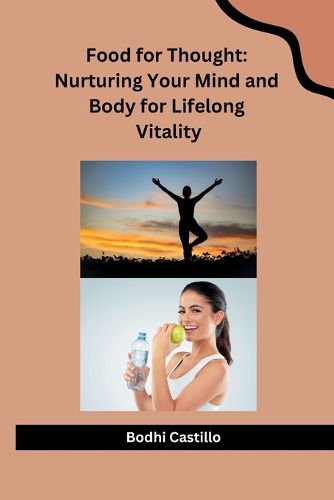Readings Newsletter
Become a Readings Member to make your shopping experience even easier.
Sign in or sign up for free!
You’re not far away from qualifying for FREE standard shipping within Australia
You’ve qualified for FREE standard shipping within Australia
The cart is loading…






Understanding Aging and NutritionIn the quest for lifelong vitality, one cannot underestimate the crucial role that nutrition plays in the aging process. As we age, our bodies undergo numerous changes that can impact our overall health and well-being. By understanding the intricate relationship between aging and nutrition, we can make informed choices to support our bodies and maintain a high quality of life.Aging is an inevitable part of life, and it brings about several physiological changes that can affect our nutritional needs. As we get older, our metabolism slows down, leading to a decrease in muscle mass and an increase in body fat. This shift in body composition requires a shift in our dietary habits to ensure we are getting the nutrients we need.One of the key aspects of understanding aging and nutrition is the concept of nutrient density. As we age, our bodies require fewer calories, but they still need the same amount (if not more) of essential nutrients. This means that every bite we take should be packed with vitamins, minerals, and other beneficial compounds. Opting for whole, unprocessed foods such as fruits, vegetables, lean proteins, and whole grains ensures that we are maximizing our nutrient intake while minimizing empty calories.Another crucial consideration is the impact of nutrition on age-related chronic diseases. Research has consistently shown that a high-quality diet can help prevent or delay the onset of conditions such as heart disease, diabetes, and certain types of cancer. By focusing on whole foods and limiting the consumption of processed foods, trans fats, and added sugars, we can greatly reduce the risk of developing these debilitating diseases.Moreover, the role of nutrition in cognitive health cannot be overlooked. As we age, our brain function naturally declines, but certain nutrients have been shown to support brain health and cognitive function. Omega-3 fatty acids, antioxidants, and B vitamins are just a few examples of nutrients that have been linked to improved brain health. By incorporating foods rich in these nutrients, such as fatty fish, berries, and leafy greens, into our diet, we can potentially protect our brain from age-related decline and enhance our cognitive abilities.
$9.00 standard shipping within Australia
FREE standard shipping within Australia for orders over $100.00
Express & International shipping calculated at checkout
Understanding Aging and NutritionIn the quest for lifelong vitality, one cannot underestimate the crucial role that nutrition plays in the aging process. As we age, our bodies undergo numerous changes that can impact our overall health and well-being. By understanding the intricate relationship between aging and nutrition, we can make informed choices to support our bodies and maintain a high quality of life.Aging is an inevitable part of life, and it brings about several physiological changes that can affect our nutritional needs. As we get older, our metabolism slows down, leading to a decrease in muscle mass and an increase in body fat. This shift in body composition requires a shift in our dietary habits to ensure we are getting the nutrients we need.One of the key aspects of understanding aging and nutrition is the concept of nutrient density. As we age, our bodies require fewer calories, but they still need the same amount (if not more) of essential nutrients. This means that every bite we take should be packed with vitamins, minerals, and other beneficial compounds. Opting for whole, unprocessed foods such as fruits, vegetables, lean proteins, and whole grains ensures that we are maximizing our nutrient intake while minimizing empty calories.Another crucial consideration is the impact of nutrition on age-related chronic diseases. Research has consistently shown that a high-quality diet can help prevent or delay the onset of conditions such as heart disease, diabetes, and certain types of cancer. By focusing on whole foods and limiting the consumption of processed foods, trans fats, and added sugars, we can greatly reduce the risk of developing these debilitating diseases.Moreover, the role of nutrition in cognitive health cannot be overlooked. As we age, our brain function naturally declines, but certain nutrients have been shown to support brain health and cognitive function. Omega-3 fatty acids, antioxidants, and B vitamins are just a few examples of nutrients that have been linked to improved brain health. By incorporating foods rich in these nutrients, such as fatty fish, berries, and leafy greens, into our diet, we can potentially protect our brain from age-related decline and enhance our cognitive abilities.